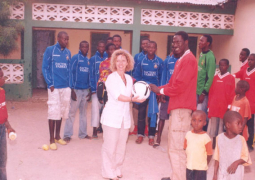Stakeholders from various sectors of The Gambia converged on Thursday at the NaNA conference hall to validate the first draft report of the AU Solemn Declaration on gender equality in Africa.
The forum was organised by the Women’s Bureau, Office of the Vice President and Ministry of Women’s Affairs, with support from the UNFPA.
In her official opening statement, the deputy speaker of the National Assembly, Hon. Fatou Mbye, said the report was a joint effort of the Ministry of Women’s Affairs, particularly the Women’s Bureau, and the United Nations Fund for Population Affairs.
She expressed her appreciation of the Government of The Gambia to the UNFPA for funding such an activity for The Gambia.
The support, according to her, has provided them the opportunity to develop the second report of the AU Solemn Declaration on gender equality.
The development of the second report on the status of implementation of the AU Solemn Declaration, a requirement for all Member States that have ratified and adopted the declaration, including The Gambia, is part of a wider effort to promote gender equity and equality.
Since the advent of the second republic of The Gambia, women advancement and gender equality has been given high regard, especially with the enactment in 2010 of the Women’s Act.
She described the move as a legislative milestone in the recognition of women’s rights in The Gambia, which has also been hailed as one of the most comprehensive attempts to domesticate international and regional conventions on women’s rights.
Madam Mbye added that one of the key challenges in promoting gender equity and equality in The Gambia is the limited capacity to conduct in-depth gender sensitization planning and analysis, and to carry out effective gender mainstreaming in national policies, strategies and programmes.
“Gender statistics also remains a key challenge to evidence-based gender responsive policymaking and programming,” she said, adding: “It is notable that The Gambia Bureau of Statistics has established a gender statistics unit, but the unit is constrained with limited trained manpower in gender analysis.”
Read Other Articles In Article (Archive)



